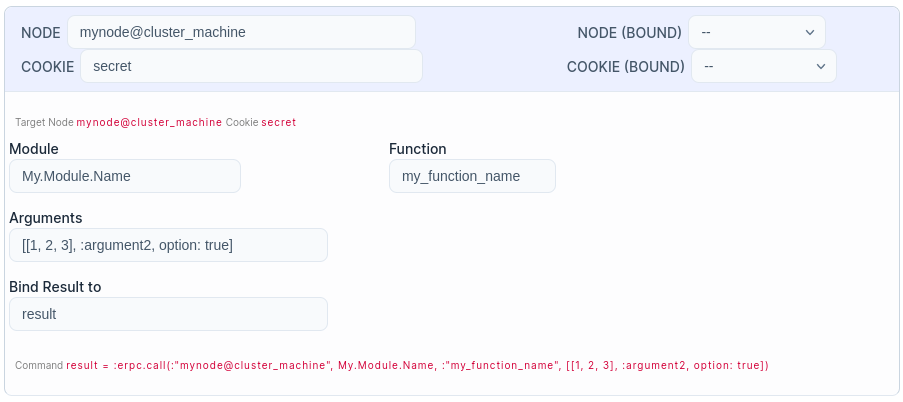View Source ClusterConnectSmartcell (ClusterConnect Smartcell v0.0.3)
ClusterConnectSmartcell
ClusterConnectSmartcell is a smart cell for Elixir Livebook that allows
connecting to a remote node in an Elixir cluster and optionally send a :erpc call.
howto
HowTo
installation
Installation
The package is published in hex and you can use it in your livebook setup section as
Mix.install([
# ...
{:cluster_connect_smartcell, "~> 0.0.1"}
# ...
])otherwise you can test the bleeding edge directly via github
Mix.install([
# ...
{:cluster_connect_smartcell, git: "https://github.com/zoten/cluster_connect_smartcell", ref: "master"}
# ...
])
usage
Usage
You will need:
- 📖 a running Livebook
- 🏝️ a running node running with a
snameyou can reach. See Erlang distribution documentation and have fun :) - 🥋 optionally, a command you want to trigger on the remote node
Once installed dependencies and added with the + Smart button the smart cell, you should see something like

Fill in the relevant parts and you should be good to go! Please note that:
if any of the
Module,FunctionorArgumentsis empty, no:erpcwill be performedat the moment
Argumentsshall be a manually crafted list. The screenshot in example will result in a call like:erpc.call(:"mynode@cluster_machine", My.Module.Name, :my_function_name, [[1, 2, 3], :argument2, option: true])that will call
My.Module.Name.my_function_name/3asMy.Module.Name.my_function_name([1, 2, 3], :argument2, option: true)
why
Why?
Because I was preparing a learning tool for my colleagues and wondered how hard could it be to write a smartcell for it (spoiler: not so hard! 🚀)
when-is-this-useful
When is this useful?
When you want to have the ability to use livebook's goodies (e.g. graphs and charts) but they are not available in the remote node's runtime, and you don't want those runtime dependencies
how
How?
See Sources to see where the inspiration (and a lot of code) came from. Please note I don't know any Vue at the moment, so be patient. I'm also very bad at styling, among the rest.
notes
Notes
gotchas
Gotchas
- Livebook process starts only as a
snamenode, so keep this in mind when connecting to a cluster - creating the
:erpccall means creating atoms where they may not exist in the context of the process running the livebook. You probably know what it means for the BEAM - calling a
:erpcmeans giving the caller total freedom on the target machine BEAM environment. Please, be aware of that and give access only to trusted people - connection to the cluster via erlang distribution is subject to all of a series of attacks and problems you should be aware of before using this for any production use case
todo
TODO
- tests. I know, I should have TDD'ed or something like that, but I really don't know how to test a smartcell right now, nor I wanted to set up cluster testing in the limited time I had to set up this
- more features (in random order)!
binding with variables created in livebook's context to use as arguments- make the argument list a
arg0,arg1, ... dynamic list instead of relying on the user to set up correctly a list of arguments - cluster connection types (
:hidden, etc) - node list retrieved from epmd (for local usage) and after connection
- connection status indicator
- make
cookiefield a password field? allow also non-Elixir.prefixed modules (-> allow connecting and:erpc-ing to erlang nodes)
- set up some sort of CI
contributing
Contributing
Please note this is still a
draftkind of project, that's why it is still< 0.1.x. However, any help is appreciated from the start!
Feel free to reach me via any means or directly file an issue/PR!
sources
Sources
If the use of any of those sources has been deemed inappropriate by the author(s), please feel free to contact me by any means and I'll take proper actions
- main.css is almost totally copied from wonderful kino_vega_lite's chart_cell original work
- main.js and assets loading is totally based on from wonderful kino_vega_lite's chart_cell original work
Any idea on how to make this appropriation more explicit is welcome!
Link to this section Summary
Functions
Try to identify possible autocompletion targets
Link to this section Functions
do_execute_remote_command(target_node, module, function, arguments)
View SourceTry to identify possible autocompletion targets
possible nodes: atoms contianing "@" character possible secrets: atoms